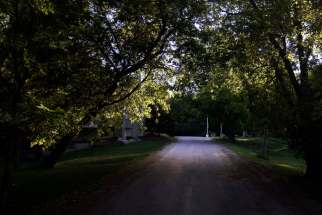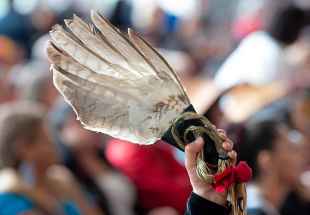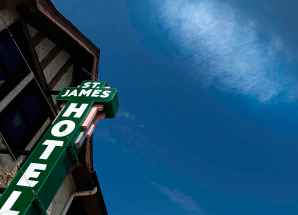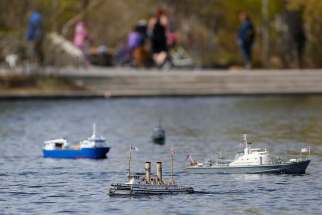No woman is disposable
Read this article for free:
or
Already have an account? Log in here »
To continue reading, please subscribe:
Monthly Digital Subscription
$0 for the first 4 weeks*
- Enjoy unlimited reading on winnipegfreepress.com
- Read the E-Edition, our digital replica newspaper
- Access News Break, our award-winning app
- Play interactive puzzles
*No charge for 4 weeks then price increases to the regular rate of $19.00 plus GST every four weeks. Offer available to new and qualified returning subscribers only. Cancel any time.
Monthly Digital Subscription
$4.75/week*
- Enjoy unlimited reading on winnipegfreepress.com
- Read the E-Edition, our digital replica newspaper
- Access News Break, our award-winning app
- Play interactive puzzles
*Billed as $19 plus GST every four weeks. Cancel any time.
To continue reading, please subscribe:
Add Free Press access to your Brandon Sun subscription for only an additional
$1 for the first 4 weeks*
*Your next subscription payment will increase by $1.00 and you will be charged $16.99 plus GST for four weeks. After four weeks, your payment will increase to $23.99 plus GST every four weeks.
Read unlimited articles for free today:
or
Already have an account? Log in here »
Hey there, time traveller!
This article was published 14/06/2019 (2367 days ago), so information in it may no longer be current.
After the release of the final report on the National Inquiry into Missing and Murdered Indigenous Women and Girls, I couldn’t help but feel a combination of guilt and shame that I’ve not done enough as a Métis man to lead by example regarding this heartbreaking national crisis.
I found myself wishing there was something — anything — I could do.
Among the recommendations in the report is a call for Canadians to take what has been learned and become strong allies with Indigenous women. Being an ally involves more than tolerance, the report states. It means actively working to break down barriers and to support others in every relationship and encounter.
Public awareness
The report also suggests we should strive to promote and advance reconciliation and contribute to public awareness.
This is my first attempt at doing this in a long time.
Before joining the Free Press in 2007, I was a corrections officer with Manitoba Justice for 15 years.
I met thousands of people in Manitoba jails. One remains in my heart, and on the list of missing and murdered Indigenous women.
Her name was Mary. In about 1999, she was a regular at the Winnipeg Remand Centre.
In those days, there weren’t a lot of women in custody — maybe a dozen at any given time. They were nearly always Indigenous.
Mary wasn’t without her problems. She’d had incredible struggles with substance abuse and wore the scars of a life filled with pain. She was a shy woman, probably about 25 at the time. She was also very small, spoke in a soft voice and had a childlike smile.
“Despite our profoundly different lives, Mary was family to me. A sister. I knew she felt safe with me”
On a morning when I was to go before a board that would decide whether I should be promoted to a corrections supervisor, which is akin to a patrol sergeant in the police, I stopped at the Shoppers Drug Mart near the jail to buy cigarettes. I was about 32 at the time.
Mary was panhandling in front of the store, and the moment she saw me strut up in my uniform, her face lit up. We exchanged greetings, and I made small talk while Mary smiled and nodded.
Once inside the store, I headed to the cooler in the back and picked out a sandwich and a bottle of orange juice for Mary.
Her hands were shaking, but she was all smiles when I handed her the bottle of juice. In an instant, she dropped it and the glass bottle shattered on the ground. Mary immediately burst into tears. I checked my watch and my interview was getting close, but I marched back into the store and bought her another juice. Mary grinned when I returned, mumbled a thank you and gave me a big hug.
She didn’t let go for about 30 seconds.
Despite our profoundly different lives, Mary was family to me. A sister. I knew she felt safe with me.
It was a poignant moment I’ll never forget. Mary hugged me tight, and it must have been quite a sight — a burly guard in uniform and a frail, young homeless woman embracing on a busy downtown street.
Vulnerable and alone
Later, at the interview, after all the questions about policy and procedure and leadership, the lady from government human resources on the panel asked me why I would make a good supervisor. I found myself telling her about my encounter with Mary. I told her how much it pained me to see Mary out there so vulnerable and alone, without anyone to help her.
The lady cried at what I said next. The words poured out of me as if someone else was talking.
I told her that in my life, I’d been guided by strong Métis women who taught me a thing or two about compassion. They taught me no woman is property. No woman is disposable. No woman deserves to be abused and thrown away like trash. No woman should ever be a victim. It was how I was raised and how I live.
I also told her the job needed men like me to help the men who hurt these women, both behind the bars and in front of them, to understand just how dreadful they had been acting.
Of course, I was promoted.
“I wish there was something I could do to make others see it my way, to make others understand we all have a responsibility to look out for one another, especially the most vulnerable among us”
I did my best to lead by example. It wasn’t always easy. I made it about another eight years and finally packed it in. But that’s another story.
One of the hardest days on that job occurred not long after seeing Mary that day. She had been found dead on the streets she called home.
There was no vigil. There was no media blitz. Just a small item in the paper with her name glaring back at me. It was like a knife to the heart.
What was it about Mary that so profoundly affected me? What was it about her killing that ate at me like cancer?
‘Property’
There was a Mary in our family tree. She is listed on a church record as the “property” of our great-great-great-great-grandfather in the mid-1800s.
There, along with the goats and the chickens and the cow, was the name of his wife. Mary, Saulteaux squaw, age 25.
Nowadays, I’m an enlightened man. The spirit of my great-great-great-great-grandmother Mary and the spirit of my murdered friend Mary now flow freely through my veins.
I wish there was something I could do to make others see it my way, to make others understand we all have a responsibility to look out for one another, especially the most vulnerable among us. Those like Mary.
I still don’t know what to do, but I suppose writing this down and sharing it with you is a good start.
Rest in peace, Mary. You are not forgotten.
willy@freepress.mb.ca

Our newsroom depends on a growing audience of readers to power our journalism. If you are not a paid reader, please consider becoming a subscriber.
Our newsroom depends on its audience of readers to power our journalism. Thank you for your support.









